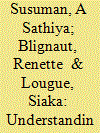| Srl | Item |
| 1 |
ID:
135072


|
|
|
|
|
| Summary/Abstract |
Purpose—This article explores the politicization of North Korean human rights in US. foreign policy and the emergence of two different networks addressing suffering inside North Korea.
Design/methodology/approach—Drawing on evidence from primary and secondary accounts, interviews with human rights activists, and participant —observation at thirteen North Korean human rights events in Washington, D.(I., 1 trace the evolution of human rights action and discourse from the 19903 to the present
period.
Findir1gs—Short~ and long—term strategic goals interacted with different moral and principled beliefs, thus resulting in two different policy—activist networks working to alleviate the plight of North Koreans. One group stressed continued humanitarian engagement with North Korea. A second network emerged, shifting their focus towards advocacy and awareness, demanding greater political rights and freedoms for North Koreans.
Practical 1mplica1ions—This article helps identify different cleavages and areas for convergence for activists, practitioners, and policymakers when addressing North Korean human rights.
|
|
|
|
|
|
|
|
|
|
|
|
|
|
|
|
| 2 |
ID:
136560


|
|
|
|
|
| Summary/Abstract |
NGO–firm partnerships have been well studied in the literature on corporate social responsibility (CSR) (Marano and Tashman 2012; Dahan et al. 2010; Oetzel and Doh 2009). However, these studies have generally limited their focus to Western multinationals and Western NGOs and, moreover, not by-and-large examine in depth the institutional settings under which either the firm or the NGO operates Building on recent institutional approaches to CSR (Brammer, Jackson, and Matten 2012; Kang and Moon 2012; Matten and Moon 2008), this paper examines how the institutional dynamics of several partnerships between Chinese firms and NGOs affect the manifestation of CSR (e.g. “implicit” vs. “explicit”). The paper also looks into how CSR and NGO–firm collaboration plays out within a changing state-corporatist framework in Chinese context (Unger and Chan 1995, 2008; Hsu and Hasmath forthcoming). The paper then argues 1) that the involvement of an NGO in the partnership reflects a changing institutional setting in China, and 2) that type and level of involvement of Chinese government institutions affects whether a given firm takes an “implicit” or an “explicit” approach to CSR.
|
|
|
|
|
|
|
|
|
|
|
|
|
|
|
|
| 3 |
ID:
134241


|
|
|
|
|
| Summary/Abstract |
The problem of disabilities is growing all over the world. Nevertheless, some progress has been made since the year 1981 was proclaimed International Year of Disabled Persons. In 2001 people living with disabilities accounted for 5% of the South African population. Because of their disabilities or the perception society has regarding their potential, this population is mostly economically inactive. This study assesses the relationship between disabilities and the adverse socio-economic impacts. Both descriptive and logistics regression models are used to understand the problem by exploring the data of the 2006 South African General Household Survey. The overall people living with disabilities and aged 15–49 years is estimated at 1742 (961 males and 780 females), when exploring people with disabilities findings reveal that the Western Cape Province’s disabled are mostly affected by physical disabilities (40%). People living with disabilities are 3.5 times (p < 0.01) more likely to suffer from illness/injuries (flu, tuberculosis (TB) and severe cough, diarrhea, blood pressure and HIV/AIDS) than others. Therefore, the study aims to contribute to a better condition of people living with disabilities in South Africa by informing and possibly changing the public perception about them.
|
|
|
|
|
|
|
|
|
|
|
|
|
|
|
|